Tekamaki (or correctly written Tekkamaki), it’s a type of sushi that uses tuna as filling. The other ingredients involve, of course, white sushi rice and nori paper (seaweed paper). It goes without saying that the love for Japanese cuisine or sushi in particular, is something universal. Let’s find out the step by step recipe to recreate this delicious dish.
Tekamaki Sushi Introduction
Sushi refers to any dish that comprises sushi rice (or vinegared rice) combined with vegetables, seafood, beef and many other ingredients. When we wrap and roll the sushi rice in nori sheets (seaweed paper), we call it a sushi roll.
Sushi rolls (usually called hosomaki in Japanese) are the most basic but quite popular in Japan. Hoso stands for “thin” and maki stands for “roll” (in contrast to futomaki, which means “thick rolls). Hosomaki – the traditional edo-style sushi rolls only consist of one main filling with nori wrapped outside.
This type of sushi is everyone’s favorite thanks to the simplicity of cooking technique and ingredients. It’s suitable for both restaurant food as well as home cooking. Hosomaki are way easier to make than thick sushi rolls. So if you’re an inexperienced cook, hosomaki is the perfect option for sushi practicing before you take it to the next level with Dragon rolls or California Rolls.
There are two most well liked hosomaki: kappamaki (uses cucumber as main ingredient) and tekkamaki (or tekamaki, uses raw tuna as main ingredient). The white rice makes the pretty red color of raw tuna stand out even more. The tuna’s red color also explains the name of the sushi tekka, which means “hot iron”.
Article may interest you: How Did Mauro Castano Lose Weight? His New Diet Plan & Weight Loss Surgery
Tekamaki sushi rice Recipe
As easy as it may seem, making the right sushi rice does take some certain skills and techniques. Here are the things you really want for arrangement
- Uncooked Japanese short-grain rice (2 cups)
- Water (1 1/2 cups)
- 2” x 2” Dried kelp or kombu (1 piece)
- Sushi vinegar (4 tablespoon)
Here are the instructions:
Step 1: Add water and discard
Add water until all the rice is submerged then immediately discard the water. Gently wash the rice for 15-20 seconds in a circular motion. Add water and dispose of then recurrent a similar interaction until the water turns out to be clear.
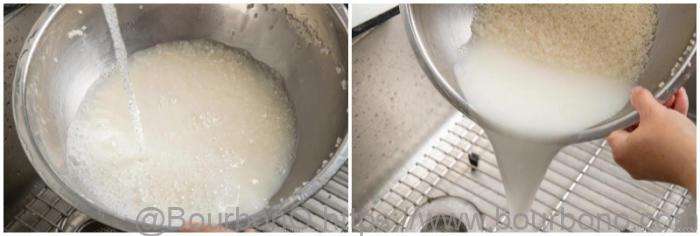
Step 2: Drain the rice and begin cooking
Utilize a fine-network sifter to deplete the rice and shake off all the abundance water. Put in the rice cooker’s insert the well-drained rice and add water (under the 3-cup line, depending on how much rice you tip in). The rice-to-water ratio should be 1 to 1 for sushi rice.
Place the dried kelp on top, wait for 20-30 minutes for the rice to soak in water, then start cooking. You can also cook rice in a donabe, an Instant Pot or a pot over the stove.

Step 3: Pour in the vinegar
If using a hangiri (wooden sushi oke), you should run it over water to moisten and drain well before use. Discard the kombu on the cooked rice and transfer the rice into the hangiri. Help the Tekamaki sushi rice cool down faster by spreading it out evenly. Pour in the vinegar while the rice is still hot. The needed sushi vinegar should be about 8-10% of the cooked rice weight.

Step 4: Incorporate the vinegar to the rice
Incorporate the vinegar to the rice by gently “slicing” the rice with a rice paddle at a 45-degree angle. Do not mix or stir the rice as it can cause the rice to be mushy. While making this “slice” motion, fan the rice to cool it down and reduce the excess moisture. Gently flip the rice and repeat the same process till the rice is cooled to room temperature.
Tekamaki Sushi Recipe
Here comes the most important part: making the tekkamaki sushi rolls.
Step 1: First you need to gather all the main ingredients for the sushi according to the list below:
- Prepared sushi rice (6 cups)
- Sushi-grade tune (4 ounces)
- Nori (4 sheets)
- Wasabi and soy sauce (for serving)

Step 2: Cut the seaweed papers in half (4 x 7 1/2”)

Step 3: Slice the tuna into long and thin sticks ( 7 1/2” long and 1/2” thick).
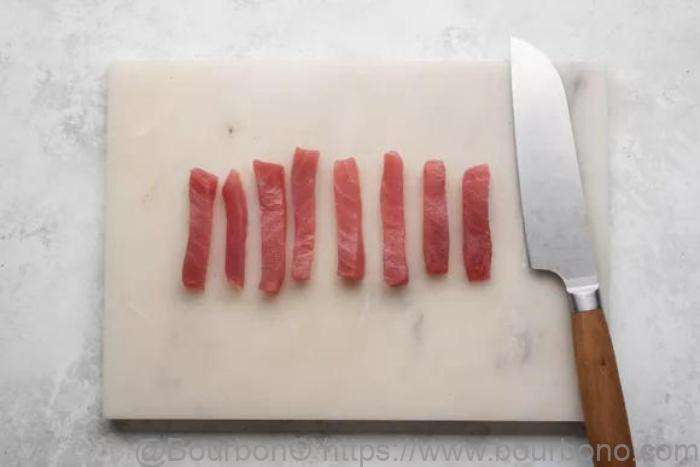
Step 4: Prepare the work surface (a chopping board) for Tekamaki making. Then spread the bamboo sushi mat (makisu) flat on the surface. Remember that the bamboo slats must be from left to right so you can roll mat away from you.
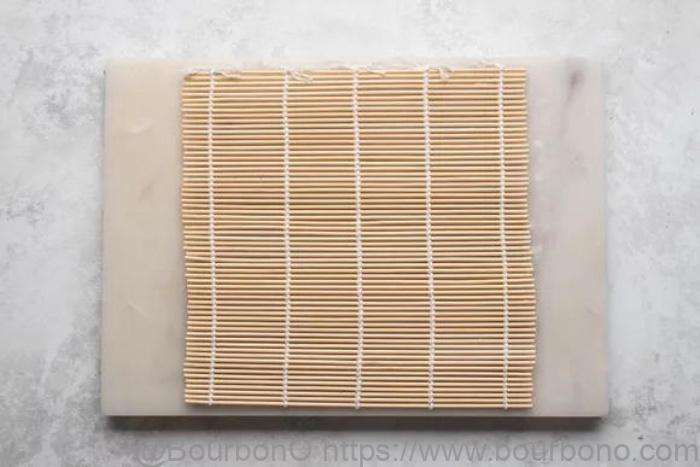
Step 5: Lay a nori paper on top of the makisu in such a way that the nori paper’s long sides close to the edge near you (the front edge of makisu).
Related article: Sweet and Savory: Jack Daniel’s Drip Cake
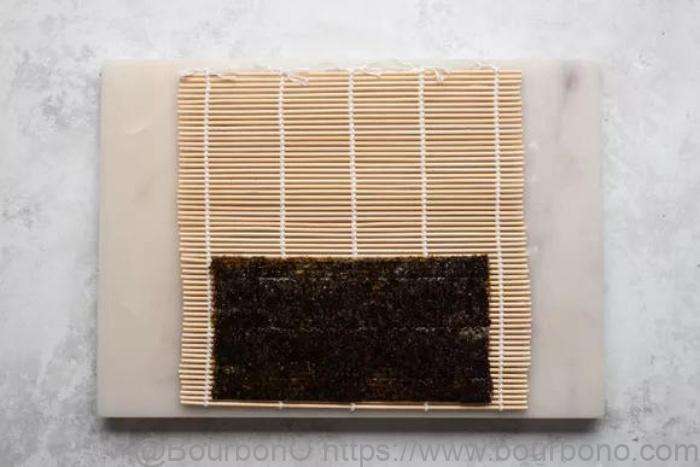
Step 6: Spread the sushi rice (about 3/4 cup) on top of the seaweed sheet.

Step 7: Arrange the tuna on the rice horizontally.

Step 8: Roll up and press forward the bamboo mat to form sushi roll shape (cylinder shape). Start from the front end of the mat toward the other end. Don’t forget to pull and press the mat firmly to tighten the Tekamaki sushi roll.

Step 9: Finally, remove the bamboo mat from the roll and you’ll get the result as shown in the below picture: a beautifully made tekkamaki sushi roll.

Step 10: Before slicing sushi, remember to wipe your knife using wet cloth. Cut the sushi roll into small pieces that are bite-size. This dish is served with wasabi and soy sauce.
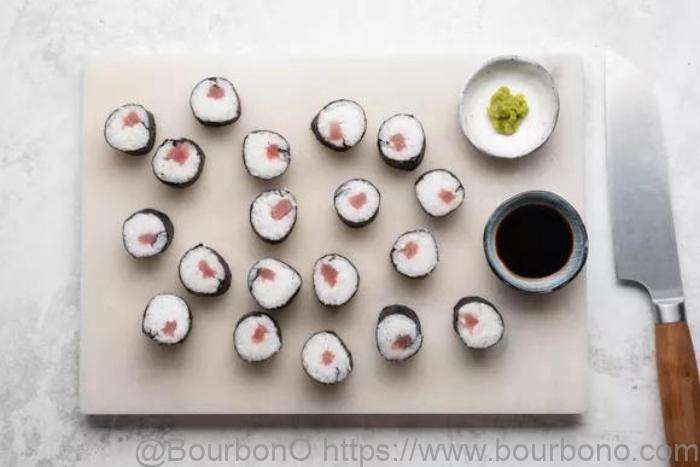
That’s the whole step by step recipe for Tekamaki Tuna Sushi. If done correctly, your recreation of tekkamaki sushi will taste fresh and flavorful. Thank you for reading and see you in Bourbon O‘s next articles!





You completed certain nice points there. I did a search on the matter and found nearly all folks will consent with your blog.cartier engagement rings
Not a unhealthy post, did it take you numerous of your time to think about it?